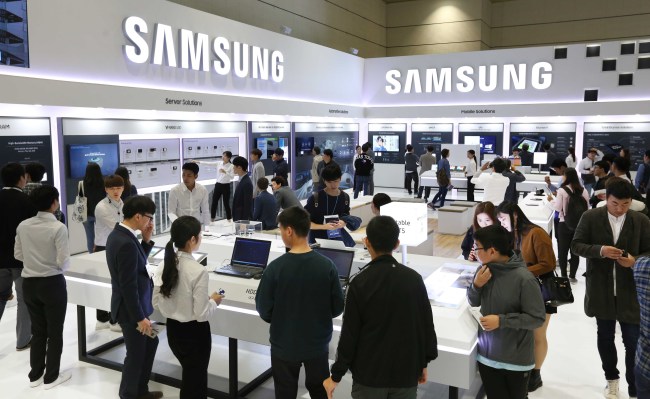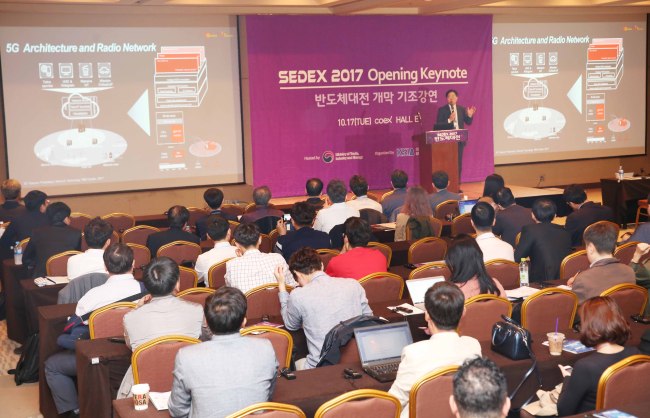Samsung CEO’s resignation viewed as ‘unfortunate’ by semiconductor industry
‘5G, IoT, autonomous driving still years away from impacting manufacturing’
By Song Su-hyunPublished : Oct. 17, 2017 - 17:18
Samsung Electronics CEO Kwon Oh-hyun’s resignation will inevitably impact the semiconductor business of the world’s largest memory chip provider in the short run, industry watchers said at a semiconductor tradeshow Tuesday.
“It is unfortunate, since he has done a good job to build the company,” said Len Jelinek, director and chief analyst at IHS Markit. “His resignation would impact the company in the short term, but I don’t think Samsung will fall from the No. 1 position to (say) No.5.”
He also highlighted scheduled resignations at global chipmakers, including Micron, SMIC and TSMC, as a common factor that might impact the industry overall.
“Samsung’s latest expansion was large enough to support the current market demand (with its leading technologies and capacity), but the company will do more next year, and in that sense, enough is never enough,” said Jelinek, who was attending the SEDEX 2017 that opened at Coex on Tuesday.
Samsung’s total capital expenditure on chip manufacturing -- including expansions of DRAM and 3-D NAND production and technology migration to 18 nanometer -- is estimated to be $17.5 billion this year, according to IHS Markit, marking the largest among competitors such as Taiwan’s TSMC and the US’ Intel.
Despite Samsung’s success in the semiconductor market this year, the atmosphere appeared to be calm among the company and its officials who took part in the three-day semiconductor exhibition.
Kwon, who had attended the exhibition every year, did not make an appearance this year, citing a business trip to the US.
After his resignation announcement Friday, Kwon is reportedly focusing on finding a new chief for Samsung’s chipmaking division, which is rumored to be announced by the end of this week at the earliest.
“It is unfortunate, since he has done a good job to build the company,” said Len Jelinek, director and chief analyst at IHS Markit. “His resignation would impact the company in the short term, but I don’t think Samsung will fall from the No. 1 position to (say) No.5.”
He also highlighted scheduled resignations at global chipmakers, including Micron, SMIC and TSMC, as a common factor that might impact the industry overall.
“Samsung’s latest expansion was large enough to support the current market demand (with its leading technologies and capacity), but the company will do more next year, and in that sense, enough is never enough,” said Jelinek, who was attending the SEDEX 2017 that opened at Coex on Tuesday.
Samsung’s total capital expenditure on chip manufacturing -- including expansions of DRAM and 3-D NAND production and technology migration to 18 nanometer -- is estimated to be $17.5 billion this year, according to IHS Markit, marking the largest among competitors such as Taiwan’s TSMC and the US’ Intel.
Despite Samsung’s success in the semiconductor market this year, the atmosphere appeared to be calm among the company and its officials who took part in the three-day semiconductor exhibition.
Kwon, who had attended the exhibition every year, did not make an appearance this year, citing a business trip to the US.
After his resignation announcement Friday, Kwon is reportedly focusing on finding a new chief for Samsung’s chipmaking division, which is rumored to be announced by the end of this week at the earliest.

At an opening keynote session of SEDEX, hosted by the Korea Semiconductor Industry Association, Jelinek forecast that total semiconductor revenue will grow 17.8 percent this year, with a significant contribution from the memory sector.
Although the SEDEX show kicked off with the theme of next-generation wireless communications, the Internet of Things and autonomous driving, the analyst said it would take some time to see these new technologies influence the manufacturing of semiconductors.
“Next-generation demand drivers such as IoT and autonomous driving are several years away from impacting manufacturing,” he said. “5G will start limited trials next year. Autonomous driving, 5G and cloud computing together will make up the next wave of electronics demand.”

Key factors that impact chip manufacturing run rates until the first of next year will still be handsets, PCs, data centers and some IoT applications, he added.
Running through Thursday, SEDEX is one of the three biggest IT shows in Korea, along with the Korea Electronics Show and the International Meeting on Information Display that are also taking place at Coex this week.
By Song Su-hyun (song@heraldcorp.com)











![[Today’s K-pop] BTS pop-up event to come to Seoul](http://res.heraldm.com/phpwas/restmb_idxmake.php?idx=644&simg=/content/image/2024/04/17/20240417050734_0.jpg&u=)




![[KH Explains] Hyundai's full hybrid edge to pay off amid slow transition to pure EVs](http://res.heraldm.com/phpwas/restmb_idxmake.php?idx=652&simg=/content/image/2024/04/18/20240418050645_0.jpg&u=20240418181020)

![[Today’s K-pop] Zico drops snippet of collaboration with Jennie](http://res.heraldm.com/phpwas/restmb_idxmake.php?idx=642&simg=/content/image/2024/04/18/20240418050702_0.jpg&u=)